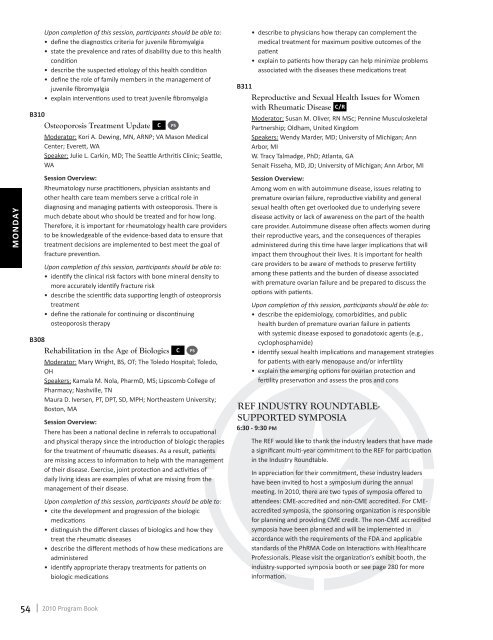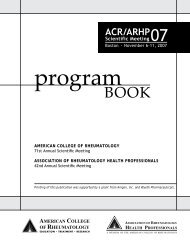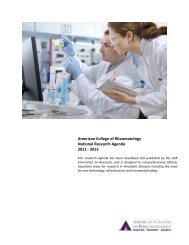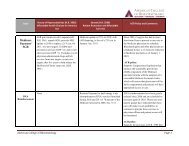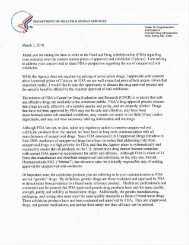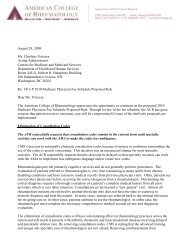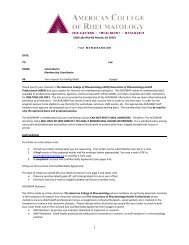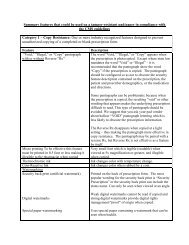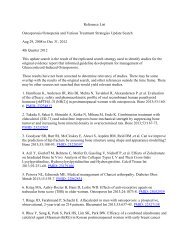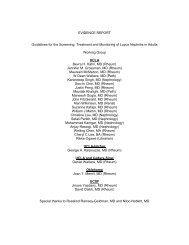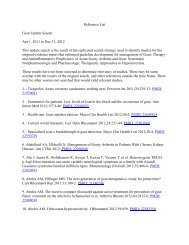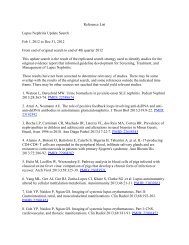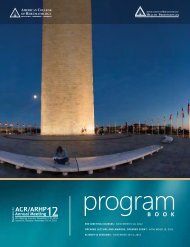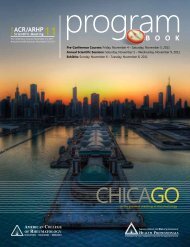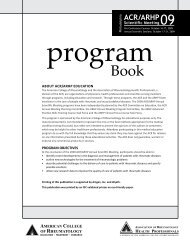B O O K - American College of Rheumatology
B O O K - American College of Rheumatology
B O O K - American College of Rheumatology
You also want an ePaper? Increase the reach of your titles
YUMPU automatically turns print PDFs into web optimized ePapers that Google loves.
monday<br />
Upon completion <strong>of</strong> this session, participants should be able to:<br />
• define the diagnostics criteria for juvenile fibromyalgia<br />
• state the prevalence and rates <strong>of</strong> disability due to this health<br />
condition<br />
• describe the suspected etiology <strong>of</strong> this health condition<br />
• define the role <strong>of</strong> family members in the management <strong>of</strong><br />
juvenile fibromyalgia<br />
• explain interventions used to treat juvenile fibromyalgia<br />
B310<br />
Osteoporosis Treatment Update C PS<br />
Moderator: Kori A. Dewing, MN, ARNP; VA Mason Medical<br />
Center; Everett, WA<br />
Speaker: Julie L. Carkin, MD; The Seattle Arthritis Clinic; Seattle,<br />
WA<br />
Session Overview:<br />
<strong>Rheumatology</strong> nurse practitioners, physician assistants and<br />
other health care team members serve a critical role in<br />
diagnosing and managing patients with osteoporosis. There is<br />
much debate about who should be treated and for how long.<br />
Therefore, it is important for rheumatology health care providers<br />
to be knowledgeable <strong>of</strong> the evidence-based data to ensure that<br />
treatment decisions are implemented to best meet the goal <strong>of</strong><br />
fracture prevention.<br />
Upon completion <strong>of</strong> this session, participants should be able to:<br />
• identify the clinical risk factors with bone mineral density to<br />
more accurately identify fracture risk<br />
• describe the scientific data supporting length <strong>of</strong> osteoprorsis<br />
treatment<br />
• define the rationale for continuing or discontinuing<br />
osteoporosis therapy<br />
B308<br />
Rehabilitation in the Age <strong>of</strong> Biologics C PS<br />
Moderator: Mary Wright, BS, OT; The Toledo Hospital; Toledo,<br />
OH<br />
Speakers: Kamala M. Nola, PharmD, MS; Lipscomb <strong>College</strong> <strong>of</strong><br />
Pharmacy; Nashville, TN<br />
Maura D. Iversen, PT, DPT, SD, MPH; Northeastern University;<br />
Boston, MA<br />
Session Overview:<br />
There has been a national decline in referrals to occupational<br />
and physical therapy since the introduction <strong>of</strong> biologic therapies<br />
for the treatment <strong>of</strong> rheumatic diseases. As a result, patients<br />
are missing access to information to help with the management<br />
<strong>of</strong> their disease. Exercise, joint protection and activities <strong>of</strong><br />
daily living ideas are examples <strong>of</strong> what are missing from the<br />
management <strong>of</strong> their disease.<br />
Upon completion <strong>of</strong> this session, participants should be able to:<br />
• cite the development and progression <strong>of</strong> the biologic<br />
medications<br />
• distinguish the different classes <strong>of</strong> biologics and how they<br />
treat the rheumatic diseases<br />
• describe the different methods <strong>of</strong> how these medications are<br />
administered<br />
• identify appropriate therapy treatments for patients on<br />
biologic medications<br />
• describe to physicians how therapy can complement the<br />
medical treatment for maximum positive outcomes <strong>of</strong> the<br />
patient<br />
• explain to patients how therapy can help minimize problems<br />
associated with the diseases these medications treat<br />
B311<br />
Reproductive and Sexual Health Issues for Women<br />
with Rheumatic Disease c/r<br />
Moderator: Susan M. Oliver, RN MSc; Pennine Musculoskeletal<br />
Partnership; Oldham, United Kingdom<br />
Speakers: Wendy Marder, MD; University <strong>of</strong> Michigan; Ann<br />
Arbor, MI<br />
W. Tracy Talmadge, PhD; Atlanta, GA<br />
Senait Fisseha, MD, JD; University <strong>of</strong> Michigan; Ann Arbor, MI<br />
Session Overview:<br />
Among wom en with autoimmune disease, issues relating to<br />
premature ovarian failure, reproductive viability and general<br />
sexual health <strong>of</strong>ten get overlooked due to underlying severe<br />
disease activity or lack <strong>of</strong> awareness on the part <strong>of</strong> the health<br />
care provider. Autoimmune disease <strong>of</strong>ten affects women during<br />
their reproductive years, and the consequences <strong>of</strong> therapies<br />
administered during this time have larger implications that will<br />
impact them throughout their lives. It is important for health<br />
care providers to be aware <strong>of</strong> methods to preserve fertility<br />
among these patients and the burden <strong>of</strong> disease associated<br />
with premature ovarian failure and be prepared to discuss the<br />
options with patients.<br />
Upon completion <strong>of</strong> this session, participants should be able to:<br />
• describe the epidemiology, comorbidities, and public<br />
health burden <strong>of</strong> premature ovarian failure in patients<br />
with systemic disease exposed to gonadotoxic agents (e.g.,<br />
cyclophosphamide)<br />
• identify sexual health implications and management strategies<br />
for patients with early menopause and/or infertility<br />
• explain the emerging options for ovarian protection and<br />
fertility preservation and assess the pros and cons<br />
REF Industry Roundtable-<br />
Supported Symposia<br />
6:30 - 9:30 PM<br />
The REF would like to thank the industry leaders that have made<br />
a significant multi-year commitment to the REF for participation<br />
in the Industry Roundtable.<br />
In appreciation for their commitment, these industry leaders<br />
have been invited to host a symposium during the annual<br />
meeting. In 2010, there are two types <strong>of</strong> symposia <strong>of</strong>fered to<br />
attendees: CME-accredited and non-CME accredited. For CMEaccredited<br />
symposia, the sponsoring organization is responsible<br />
for planning and providing CME credit. The non-CME accredited<br />
symposia have been planned and will be implemented in<br />
accordance with the requirements <strong>of</strong> the FDA and applicable<br />
standards <strong>of</strong> the PhRMA Code on Interactions with Healthcare<br />
Pr<strong>of</strong>essionals. Please visit the organization’s exhibit booth, the<br />
industry-supported symposia booth or see page 280 for more<br />
information.<br />
54<br />
2010 Program Book


